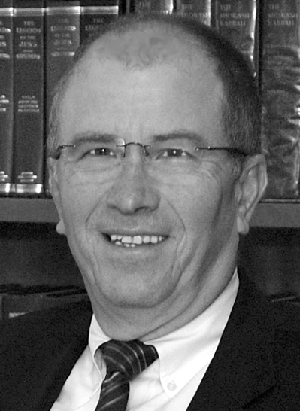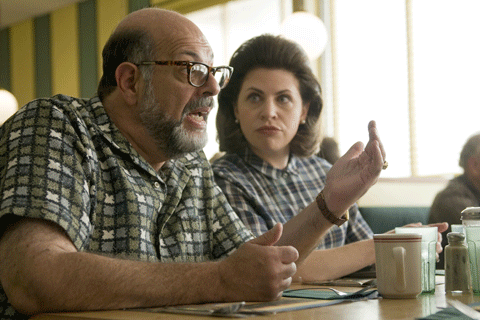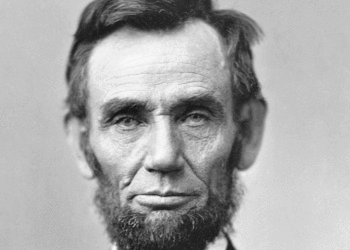The new film from St. Louis Park natives Joel and Ethan Coen explores life’s most fundamental questions
(Editor’s Note: This sermon contains spoilers about the film and reveals crucial plot points.)
By RABBI NORMAN M. COHEN
Is it merely the title of the new Coen brothers’ movie, a Job-like story that asks more questions than it answers?
Is it a highly exaggerated cluster of stereotypes and caricatures that mock, humiliate and incite?
Is it a riddle that triggers nostalgia for a time and place that helped us to become who we are today?
Or is it a serious formula for dealing with the age-old questions of good and evil, reward and punishment, and God’s role in the world?
This is a movie that has evoked lots of reaction. In this community, many people were thrilled to hear and see familiar people and places. Claudia Schnitker appears as Mrs. Sussman, the wife of the dentist — maybe she can explain the mysterious inscription on her husband’s patient’s teeth! Piper Sigel Bruce is the girl in the Talmud Torah who gets her Hebrew wrong and is corrected. I can tell you that she learned it properly at our religious school. She was only acting!
Marshak, the name they give to the eldest and wisest of the rabbis, is the name of a member of our congregation who has been part of the university administration and physics department for more than three decades. In an earlier version of the script, the rabbi emeritus is actually called Rabbi Minda, who was in fact the rabbi emeritus of Temple Israel when the Coen brothers lived here. There are no references to Bet Shalom for one good reason — at that time there was no Bet Shalom.
If you like the Coen brothers’ movies, you will probably like this one. If you don’t, you probably won’t. Of all their films this is the most identifiably Jewish, most potentially philosophical and most troubling theologically. It is highly entertaining, but perhaps at the expense of a number of individuals and ethnic groups.
 Rabbi Norman M. Cohen
Rabbi Norman M. Cohen
A disclaimer at the end of the credits reads: “No Jews were harmed during the filming of this movie.” And that is one of the main objections people raise about the film. Will the use of anti-Semitic images and attitudes have a negative effect?
The debate reminds me of the great Archie Bunker debate years ago when Norman Lear’s All in The Family first appeared, creating an outrage over whether it was appropriate to depict such images in mass communication. Some said that it will make bigots of people. As it turned out, the show helped to raise consciousness about prejudice and inspired positive change in our culture.
Jews are not the only target of stereotyping in A Serious Man. The film depicts Asians as highly competitive for grades, so much so that they would do anything — including cheat, bribe and threaten lawsuits — using libelous litigious arguments to get what they want. Will people now think that’s what Asians do? It might reinforce a pre-existing prejudice, but would not create such a bigoted attitude.
In fact, as a rabbi, I have as much reason as anybody to be offended by the movie’s images. The most exaggerated stereotypes in the entire story are those of the three rabbis. Yes, three rabbis and no apparent wisdom. But I don’t mind the portrayals of the rabbis. If I behaved like them, I might. It does not worry me that people are going to confuse them with me. I can take a joke.
But there is so much to like about the movie.
The movie had me from the beginning. “Receive with simplicity everything that happens to you.” Never before had I witnessed words attributed to the great medieval Jewish commentator, Rashi, flashed on the screen in the opening scene of an American movie. At a Torah study class, yes; referenced in sermons, of course. But as the words on which the first scene of a movie opened, never! Then again, until the Coen brothers’ The Big Lebowski, I never imagined I would hear “I am Shomer Shabbos” with the f-word in the middle.
Some suggest that A Serious Man is a modern rendition of the story of Job. If so, then the author of both the movie and the biblical story share skepticism about the popular religious notion that the good are always rewarded and the wicked punished, that there is an automatic connection between a person’s deeds and his consequent fate and destiny.
Indeed, one of the overarching themes of the movie is the uncertainty of life. Larry lectures his classes about Heisenberg’s Uncertainty Principle. He tells the students that, “It proves we can’t ever really know what’s going on. So it shouldn’t bother you, not being able to figure anything out, although you will be responsible for this on the midterm.”
If the Coen brothers are so passionately opposed to the belief in Divine justice, then why do they tease with several incidents that speak in favor? Can we surmise that Larry Gopnick, the protagonist, is a descendant of the Yiddish-speaking couple in the opening shtetl scene and conclude that he is being punished for their misdeeds? And why then does Sy Ableman find his punishment in a car accident that cuts short his plans to destroy Larry’s family life? And isn’t it curious that Larry’s single act of corruption is followed by possibly the worst personal blows of all.
Perhaps the Coen brothers have revealed their unconscious. Or better yet, perhaps they have confirmed what we can find within our own souls — the wish that the world did work that way: that reward and punishment always made sense, and that God would vigorously defend the principles upon which religion seems to be founded and the promises that we expect to be fulfilled.
Alas, that is not the way the world works. And so the question remains: The question about which the movie revolves. How can we find a reliable moral order in the universe?
Long ago the biblical author of Job understood that there are not always satisfying answers to life’s most difficult questions. Job seems to have been punished severely. His children are dead, he has lost all his wealth. He is writhing in pain from physical illness as well. He is critical of his friends who come to visit him in his misery. They tell him, “You must have sinned. Surely God would not punish you if you were innocent.”
Job grows impatient with them as he does with God. Job’s reputation for patience is not supported in his story. He reacts strongly, as most of us would do.
In Larry’s story we have a similar setting. He is bombarded with misfortune. His wife is cheating on him. His kids are stealing from him. His brother is sick and gets into one problem after another, with Larry taking responsibility for him. Larry is being threatened by one of his students. Larry is being considered for tenure but does nothing to advance his cause. Larry allows the department chair to taunt him with inappropriate statements about anonymous letters vilifying Larry.
But Larry is not Job. Only in his dreams does he come to life and act. In real life, he merely says “I didn’t do anything,” again and again and again. He is unlike Job and is actually similar to two other characters in Jewish literature: Isaac Bashevis Singer’s Gimpel the Fool and Y.L. Peretz’s Bontshe Shveig.
He is the prototypical friar — in Hebrew, the sucker who is the fall guy every time. Sy, the man with whom Larry’s wife Judith is cheating, treats Larry with passive aggressive mockery. They convince Larry to move out of the house and into a motel. After Sy dies, Larry ends up paying for Sy’s funeral. Larry is the ultimate in naïveté — a modern extension of his ancestor in the shtetl scene, with no backbone whatsoever.
Larry tells people that his wife and her lover Sy have not slept together. He believes it. He exercises no discipline over his kids. In fact, he responds to his son’s badgering requests by climbing on top of the house to repair the TV reception.
In the Coen brothers’ typical style, this is homage to a popular broadway play and film of that era. Larry fiddles with the TV antenna, thus making him the Fiddler on the Roof. At least Tevye argued with God. Larry’s gazing from the roof at the naked neighbor Mrs. Samsky is a reference to the biblical King David eyeing Bathsheba who sunbathed on her roof. And there is a thinly veiled imitation of the most popular film of that era, The Graduate, when Mrs. Samsky brings drinks into the parlor where she is attempting to seduce Larry, who cannot act on any of his urges, moral or not.
Larry is such a pitiful character. The Columbia Record Club harasses him about his missing payments for a subscription that he never initiated. He has done nothing, but that is how those record clubs worked. Doing nothing obligates you to them. The Columbia Record Club is the perfect metaphor for life — doing nothing gets you nothing, or worse.
Indeed in his own field of academic expertise, Larry admits incompetence. In trying to explain the uncertainty principle, he tells his student. “I only know the math, I don’t even know the stories.” He pays attention to the details but doesn’t see the big picture. His own story he does not understand.
This is a major message of the film. Life is dominated by uncertainty. We must find certainty in our own moral compass. We all would like to have an understanding of life with its secrets, but there is never a satisfactory final answer. It is an ongoing struggle. Within that chaos we must make sense.
The Coen brothers tease us with the theological conundrum of eternity. At the conclusion of the film is the punch line. As soon as Larry has achieved the coveted tenure, the quest for which was one of his anxiety-producing challenges, he finally sways from his position of academic and moral integrity and erases the failing grade for the Asian student who successfully bribed this upstanding physics professor. The moment Larry pencils in a C- to replace the F, his phone rings with the bad tidings from his physician that his X-rays have provided bad news, and that he must come and see the doctor immediately.
And as a coda, the film ends abruptly with the threatening tornado heading towards the Hebrew school students, whose wise teacher cannot figure out how to unlock the door to the shelter. This reference to the book of Job’s depiction of God answering Job out of the whirlwind reminds us of one of life’s recurring themes: Just when things seem to be going your way, when your family problems have been resolved, when your professional career finds success, watch out. There’s always another storm that comes from nowhere.
The Coen brothers’ movie title raises a Jewish question that is at the center of the meaning of life. Who and what is a serious man?
 Judith Gopnik (Sari Lennick, right) thinks that Sy Ableman (Fred Melamed) is a “serious man.” (Photo: Wilson Webb)
Judith Gopnik (Sari Lennick, right) thinks that Sy Ableman (Fred Melamed) is a “serious man.” (Photo: Wilson Webb)
Is it Judith’s lover, Sy Ableman? Larry’s wife insists that he is. The rabbi eulogizes him with that very description. But of course not — he is merely an adult bully, a person who through passive aggressive behavior assaults poor Larry. In the classroom scene, Sy, like a dybbuk, appears after his death and reveals his true nature, what he did while alive only surreptitiously by verbal manipulation and anonymous letters. He physically attacks Larry and mercilessly bangs Larry’s head against the blackboard.
Is it Judith Gopnick, Larry’s cuckolding wife, whose mouth opens and out comes sarcasm and cynicism? A serious man must be one who speaks with kindness, wisdom and respect.
Is it Larry’s brother, Arthur? Arthur is presented as a genius, who has a system for winning at cards, and spends countless hours writing his theories into a notebook, which is revealed to be a conglomerate of nonsense. Yet Arthur does not have a clue. He is jealous of his brother and complains that Larry’s life is just fine. “Look at all that God has given you. I have nothing.” Everything is relative. In reality, Arthur is a burden who won’t go away. He lives in Larry’s house, hogs the bathroom, and when Larry moves out to a motel, Arthur goes with him. He has a cyst on his neck that he keeps trying to drain but it comes back again and again. Arthur not only has a cyst. He is a cyst. He is certainly not a serious man.
Is it Larry? He says he want to be a serious man. He is trying to be a serious man. That’s what he says, or whines, when he seeks the advice of the rabbis. But can he be serious when he cannot see the reality all around him? Is he not taking Pirke Avot too far in giving the other person the benefit of the doubt?
Are the rabbis serious men? In one sense, they do offer him helpful advice. The young assistant, still wet behind the ears, urges Larry to use every crisis as an opportunity to change perspective and appreciate a different way of thinking about life. Ordinarily this would be sage advice, but not from someone who has had such limited life experience and directs Larry to look at the parking lot. This rabbi is not yet a serious man.
And the senior rabbi, in his own pompous way, tells Larry that there are no answers to those kinds of questions, that the mysteries must remain mysteries and we had better get used to living with unanswered questions. Good advice, but the vehicle he uses — repeating a confidential story and disrespecting non-Jews — makes this rabbi cynical and not a serious man.
The rabbi emeritus, Marshak, who sits in his study and refuses to see Larry, gives Larry the impression that his questions do not deserve a hearing, at least not from the learned rabbi. Yet this same rabbi instead offers Larry’s son the sagest wisdom of the movie, the source of which surprises us. This octogenarian rabbi quotes the words of Gracie Slick and Jefferson Airplane: “When the truth is found to be lies and all the joy within you dies (the rabbi actually says “when all the hope within you dies.” Is not a life without hope one without joy?).”
This is the message of Jewish tradition. The most important thing in life is our relationship to others. That is how we serve God. “Don’t you want somebody to love?” — people, our friends and our loved ones, to care about, and to treat with dignity and respect?
This is one of life’s basic observations. Most religions attempt to answer that question. It is an essential part of growing up: to realize that we must find very concrete ways of experiencing the Divine in our actions and relationships with God’s creation — other human beings. We cannot passively rely on a superstitious faith in a God who we naïvely reduce to a celestial Santa Claus or divine bellhop. And the way in which we understand and appreciate our faith and tradition will help us to cope, and potentially can make a great difference in our attitude toward all that happens in life.
This elderly rabbi gives the boy advice from a contemporary source. Although he is the oldest character in the film and obviously has access to generations of Jewish wisdom from the Bible, Talmud, Midrash and commentaries, he is not stuck in the past. And when he concludes his recitation of Jefferson Airplane, Marshak says quite simply, “Be a good boy.” Danny, the Bar Mitzva, looks up and his eyes smile for the first time in the film.
A serious man is the answer to the question that is asked throughout the film. Where is goodness, where is God, why is there not justice? Judaism’s answer has always been that it is our responsibility to fill the gap; to bring order and justice and fairness and reward in an appropriate fashion. We do that by creating community and following the path of mitzva. We do it by striving to be mensches. Indeed, the true definition of being a mensch is to be a serious man — to be a good boy!
The way that we live is the center of the moral order in the universe, when there seems to exist no supernatural deity who dishes out reward and punishment in the simplistic way that so many fundamentalist interpretations of religion have insisted for far too long, from the time of Job to the era of Larry Gopnick.
***
Rabbi Norman M. Cohen is the spiritual leader at Bet Shalom Congregation in Minnetonka. He delivered this sermon on Dec. 11.









 Rabbi Norman M. Cohen
Rabbi Norman M. Cohen Judith Gopnik (Sari Lennick, right) thinks that Sy Ableman (Fred Melamed) is a “serious man.” (Photo: Wilson Webb)
Judith Gopnik (Sari Lennick, right) thinks that Sy Ableman (Fred Melamed) is a “serious man.” (Photo: Wilson Webb)









